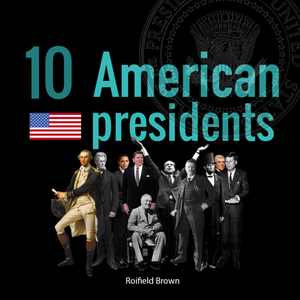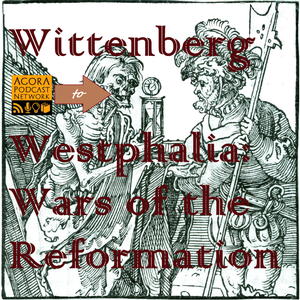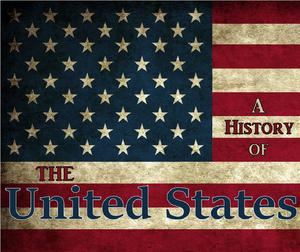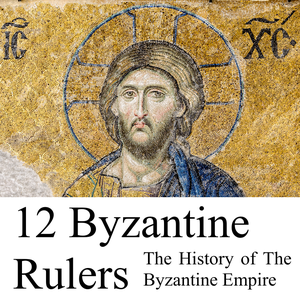
10 American Presidents Podcast
Roifield Brown
From Washington to Obama, 10 American Presidents a podcast narrated by guest hosts.The life and legacy of an American President. Each show is intercut with music and where possible archive news clips or dramatisations to set a feeling of place and t[...]
- 3 minutes 24 secondsIn Glen's Steps: A Journey with Dementia PromoIn Glen's Steps: A Journey with Dementia is a deeply personal and heartfelt podcast series that explores the impact of dementia on Glenroy Brown, a man of remarkable character, and his family. Through candid conversations, personal reflections, and expert insights, we share the journey of his life, from his early years in Jamaica to his current experiences with dementia. This series offers an intimate look at the challenges, changes, and unexpected joys that come with living with this condition, providing support and understanding to families facing similar challenges.
Hosted on Acast. See acast.com/privacy for more information.
16 May 2024, 12:23 pm - 39 minutes 57 secondsTearing Down Walls: Reagan's End Game
Description:
In this episode, we delve into the intricate web of events that defined Ronald Reagan's presidency. From the Iran-Contra affair's explosive revelations to the ground-breaking negotiations with Soviet leader Mikhail Gorbachev, we explore the highs and lows of Reagan's time in office. Discover how Reagan navigated the brink of impeachment, his strategic dealings with the USSR, and the eventual thawing of Cold War tensions. Join us as we uncover the last term and the complex legacy of a president who faced enormous challenges both domestically and on the world stage.
Show Notes:
- Iran-Contra Affair: Unravel the scandal that almost toppled Reagan's presidency. Understand the implications of the arms sales to Iran and the diversion of funds to the Contras.
- Reagan's Crisis Management: Analyse how Reagan's response to the scandal differed from Nixon's during Watergate and the role of the Tower Commission.
- Diplomatic Dance with Gorbachev: Explore the intricate negotiations between Reagan and Gorbachev, leading to groundbreaking arms reduction treaties.
- The Cold War Thaw: Delve into the summits that symbolised a major shift in Soviet-American relations and the steps towards ending the Cold War.
- Reagan's Economic Policies: Examine the impact of Reagan's economic policies, from battling inflation to the growth of income inequality.
- Legacy and Influence: Reflect on Reagan's legacy and his influence on future American politics, including his post-presidential life.
Hosted on Acast. See acast.com/privacy for more information.
8 February 2024, 7:12 pm - 31 minutes 33 secondsEp 30: Reagan's Midterm Years: Shaping America 1984-1986 Iwan Morgan
Between 1984 and 1986, Ronald Reagan, was in his second term of office after defeating Walter Mondale in a landslide victory in the 1984 election:
Domestic Policy:
- Reagan enacted significant tax reforms with the Tax Reform Act of 1986, which simplified the tax code by reducing rates and removing several tax breaks.
- He continued to implement economic policies known as "Reaganomics," inspired by supply-side economics, focusing on tax cuts and reduction in government spending, except for military expenditure.
- The federal debt increased significantly due to the combination of tax cuts and an increase in defense spending, leading to budget deficits.
- Reagan signed the Immigration Reform and Control Act of 1986, which enacted sweeping changes to U.S. immigration law and granted amnesty to three million illegal immigrants.
- The ramifications of Ronald Reagan's war on drugs included escalated incarceration rates, disproportionately impacting communities of color, and fostering a punitive approach to drug policy. Additionally, his administration's initial indifference to the AIDS epidemic contributed to delayed research and intervention efforts, exacerbating the crisis, particularly among marginalised populations.
- Reagan appointed William Rehnquist as the new Chief Justice of the Supreme Court in 1986, elevating him from his position as an Associate Justice. This change was part of Reagan's broader impact on the Court, emphasizing a conservative shift in its composition and decisions.
Foreign Policy:
- The administration faced controversy over covert arms sales to Iran to fund Contra rebels in Nicaragua, leading to the Iran-Contra scandal, which resulted in the conviction or resignation of several administration officials.
Public Perception:
- Reagan's presidency during this period was marked by a revival of national confidence and prestige.
Hosted on Acast. See acast.com/privacy for more information.
30 September 2023, 11:35 pm - 28 minutes 50 secondsEp: 29 Ronald Reagan's Presidency 1983 - 1984 Iwan Morgan
During Ronald Reagan's first term in office from 1983 to 1984, his presidency faced several defining moments and policy initiatives. One key event was the escalating Cold War with the Soviet Union. Reagan pursued a robust defence policy, increasing military spending with his Strategic Defence Initiative (SDI) or "Star Wars" program, which aimed to develop missile defence systems.
In foreign affairs, Reagan faced challenges in Central America, where he supported anti-communist movements, including the Contras in Nicaragua. His administration also navigated through the Lebanese Civil War and the bombing of the U.S. Marine barracks in Beirut.
Reagan's leadership style was characterized by his ability to communicate strongly, most notably exemplified in his "Evil Empire" speech overall, the end of Reagan's first term was marked by continued Cold War tensions and rising economic prosperity, and an assertive foreign policy.
Support us on Patreon https://www.patreon.com/10americanpresidents
Make a one off donation here paypal.me/roifield
Hosted on Acast. See acast.com/privacy for more information.
10 September 2023, 12:28 am - 28 minutes 7 secondsEp: 28 Ronald Reagan's Presidency 1981 - 1983 Iwan Morgan
Narrated by Professor Ewan Morgan, Emeritus from University College London, whose book 'Reagan: American Icon' was named one of the best politics books in 2016 by The Times, this episode of "10 American Presidents" delves into the presidency of Ronald Reagan. Beginning his first term on January 20, 1981, Reagan introduced a laissez-faire philosophy and championed a set of neoliberal reforms known as "Reaganomics." His inaugural address famously declared that "government is not the solution to our problem, government is the problem." This episode explores key aspects of Reagan's economic policies, including tax cuts, deregulation, and his approach to tackling inflation, unemployment, and government spending. It sheds light on the successes and challenges that marked Reagan's economic legacy during his presidency.
Reagan collaborated with boll weevil Democrats and signed the Economic Recovery Tax Act of 1981, significantly reducing federal income tax rates. He also lifted federal oil and gasoline price controls and later enacted the Tax Equity and Fiscal Responsibility Act of 1982 to address growing concerns about the mounting federal debt. Despite criticism from some of his supporters, Reagan defended his preservation of cuts on individual income tax rates. The Tax Reform Act of 1986 further streamlined the tax system, reducing the number of tax brackets and top tax rates.
Facing stagflation upon taking office, Reagan implemented measures to combat inflation and unemployment. Federal Reserve Chairman Paul Volcker's tight money policy led to high interest rates, raising unemployment but eventually contributing to a prolonged economic expansion. The appointment of Alan Greenspan as Volcker's successor in 1987 further stabilized the economy, although the Black Monday stock market crash occurred during Greenspan's tenure.
Reagan also tackled government spending, approving cuts to Social Security and later signing amendments to ensure its financial security. He initiated defense spending increases while cutting funding for federal assistance programs like food stamps and unemployment benefits. Deregulation was another significant aspect of Reagan's economic policies. By 1986, almost half of the federal regulations in place in 1981 had been eliminated. The 1982 Garn–St. Germain Depository Institutions Act deregulated savings and loan associations, but this led to riskier activities and contributed to the savings and loan crisis.
As Reagan's economic policies unfolded, the nation experienced a mix of successes and challenges. Economic growth alternated with periods of recession, inflation was combated, and the economy became more deregulated. Reagan's approach to taxes, spending, and regulation left a lasting impact on the American economic landscape.
Hosted on Acast. See acast.com/privacy for more information.
16 August 2023, 4:38 pm - 29 minutes 16 secondsEp: 27 Ronald Reagan's Journey to the Presidency 1973-1980 - Iwan Morgan
In this episode of "10 American Presidents," we focus on the years that paved the way for Ronald Reagan's momentous ascent to the presidency. Join our esteemed host, Professor Iwan Morgan, as he chronicles Reagan's political trajectory from 1973 to his election in 1980. Delve into the pivotal events, strategic decisions, and defining moments that shaped Reagan's path to the White House during this crucial period.
1. Introduction:
- Professor Iwan Morgan sets the stage, highlighting the political landscape of the 1970s and the factors that propelled Reagan to prominence.
- Exploring the emergence of Reagan's political ideology and his appeal to a growing conservative base.
2. The California Years:
- Tracing Reagan's influential tenure as Governor of California (1967-1975) and its impact on his national political ambitions.
- Examining Reagan's early adoption of conservative principles and his ability to connect with voters on both personal and ideological levels.
3. National Recognition:
- Unpacking Reagan's transition from a regional figure to a national political force.
- Discussing his role as a prominent spokesperson for conservative causes and his growing influence within the Republican Party.
4. Challenging the Incumbent:
- Detailing Reagan's spirited challenge to President Gerald Ford for the Republican nomination in 1976.
- Analyzing the implications of Reagan's narrow loss and the strategic adjustments that shaped his subsequent campaigns.
5. The 1980 Campaign:
- Exploring Reagan's successful bid for the Republican nomination in 1980, navigating primary challenges and securing the party's support.
- Discussing the key moments and strategies that propelled Reagan to victory in the general election.
Hosted on Acast. See acast.com/privacy for more information.
31 July 2023, 5:11 pm - 1 hour 11 minutesRonald Reagan Q&A with professor Iwan Morgan
Iwan Morgan is a Professor of US Studies emeritus at the Institute of the Americas, University College London, UK. He is also a distinguished fellow of the Rothermere American Institute, University of Oxford, UK.
He served as chair of the executive committee of the Historians of the Twentieth Century United States from 2007 to 2013 and was a member of the executive committee of the British Association of American Studies from 2009-2012.
he spoke to Roifield on Zoom with a select group of listeners in 2021
Hosted on Acast. See acast.com/privacy for more information.
20 February 2023, 10:48 pm - 1 minute 48 secondsListen to podcasts from Roifield Brown
Listen to podcasts from Roifield Brown
- 10 American Presidents Podcast
- DumTeeDum - A show about BBC Radio's 'The Archers'
- How Jamaica Conquered the World
- Intelligent Speech - interviews, conversations and presentations of ideas
- Map Corner
- Mid-Atlantic - conversations about US, UK and world politics
- The Race Directors Podcast - F1
- The Things That Made England
Hosted on Acast. See acast.com/privacy for more information.
18 October 2022, 12:35 am - 56 minutes 52 secondsMartin Van Buren - an excerpt from the book the Presidents - Iain Dale
I have written a chapter and President Martin Van Buren for Iain Dale's book The Presidents, this episode is my interview with Iain talking about Van Buren and a reading from the chapter.
The Presidents: 250 Years of American Political Leadership
Book by Iain Dale
https://www.amazon.co.uk/Presidents-Years-American-Political-Leadership/dp/1529379520/
Hosted on Acast. See acast.com/privacy for more information.
27 December 2021, 12:56 pm - 45 minutes 46 secondsThe Election of 1960 - Kennedy vs Nixon part 1
The 1960 United States presidential election was the 44th quadrennial presidential election. It was held on Tuesday, November 8, 1960. In a closely contested election, Democratic United States Senator John F. Kennedy defeated incumbent Vice President Richard Nixon, the Republican Party nominee.
Purchase your tickets to Intelligent Speech April 24th here www.intelligentspeechconference.com
Hosted on Acast. See acast.com/privacy for more information.
16 February 2021, 12:35 am - 53 minutes 56 secondsEP: 26 - Inaugural addresses with Clint Loshe - live on Zoom
Newly sworn-in presidents usually give a speech referred to as an inaugural address. As with many inaugural customs, this one was started by George Washington in 1789. After taking his oath of office on the balcony of Federal Hall, he proceeded to the Senate chamber where he read a speech before members of Congress and other dignitaries. Every president since Washington has delivered an inaugural address. While many of the early presidents read their addresses before taking the oath, current custom dictates that the chief justice administer the oath first, followed by the president's speech.
Jefferson's first inaugural. This comes on the heels of the election of 1800, famous for how divisive it was. Jefferson talks about the need to "restore to social intercourse that harmony and affection" that had taken a pretty severe beating. "We are all Republicans, we are all Federalists."
Lincoln's first inaugural. The famous lines about "we must not be enemies" begin in the final paragraph of the speech. There's also a good angle on speechwriting here, because the final paragraph was not written by Lincoln, but drafted by his incoming secretary of state, William Seward—which Lincoln then polishes into the famous lines we're familiar with.
Lincoln's second inaugural. This is one of the shortest inaugurals, in which Lincoln basically says up front "I don't need to tell you that there was a war..." and I think it's notable that it *sounds* tired, even on the page. The famous "with malice toward none" quote begins.
FDR's first inaugural. FDR opens with the section that includes the famous "The only thing we have to fear is fear itself." (Which is possibly something he picked up from Thoreau!) "This is preeminently the time to speak the truth, the whole truth, frankly and boldly. Nor need we shrink from honestly facing conditions in our country today" are something relevant to today. His closing lines are also pretty good in terms of talking about coming together to face down a national emergency.
Kennedy is not quite a crisis speech in the same way, because the crisis was international rather than at home. But his call to recommit to American values is a parallel to Biden's, perhaps. The paragraph preceding "Ask not what your country can do for you".
I see some parallels between Trump's "American Carnage" speech and Reagan's "Government is the Problem" speech that might be interesting to talk about. They both talk about restoring power to the people (possibly a deliberate echo by Trump, who was looking to Reagan for inspiration; Reagan's framing was about "special interest groups" and how the only special interest groups that matter are Americans), but they both also let their cynicism show.
Trump is nearly all cynicism, of course, but Reagan's "government is the problem" is also a cynical position that's at odds with other modern inaugurals. (In Reagan's speech, "government is the problem" section. In Trump's speech. Unfortunately, it's just 4 sentences, but it's spread over nearly a minute, ugh!) And then if you want to endcap this, you could bring in Clinton's second inaugural "And once again, we have resolved for our time a great debate over the role of government. Today we can declare: Government is not the problem, and government is not the solution. We, the American people, we are the solution. Our founders understood that well and gave us a democracy strong enough to endure for centuries, flexible enough to face our common challenges and advance our common dreams in each new day."
Hosted on Acast. See acast.com/privacy for more information.
28 January 2021, 9:50 pm - More Episodes? Get the App
Your feedback is valuable to us. Should you encounter any bugs, glitches, lack of functionality or other problems, please email us on [email protected] or join Moon.FM Telegram Group where you can talk directly to the dev team who are happy to answer any queries.
 Wittenberg to Westphalia
Wittenberg to Westphalia
 A History of the United States
A History of the United States
 When Diplomacy Fails Podcast
When Diplomacy Fails Podcast
 12 Byzantine Rulers: The History of The Byzantine Empire
12 Byzantine Rulers: The History of The Byzantine Empire
 History of Germany Podcast
History of Germany Podcast
 American Biography
American Biography